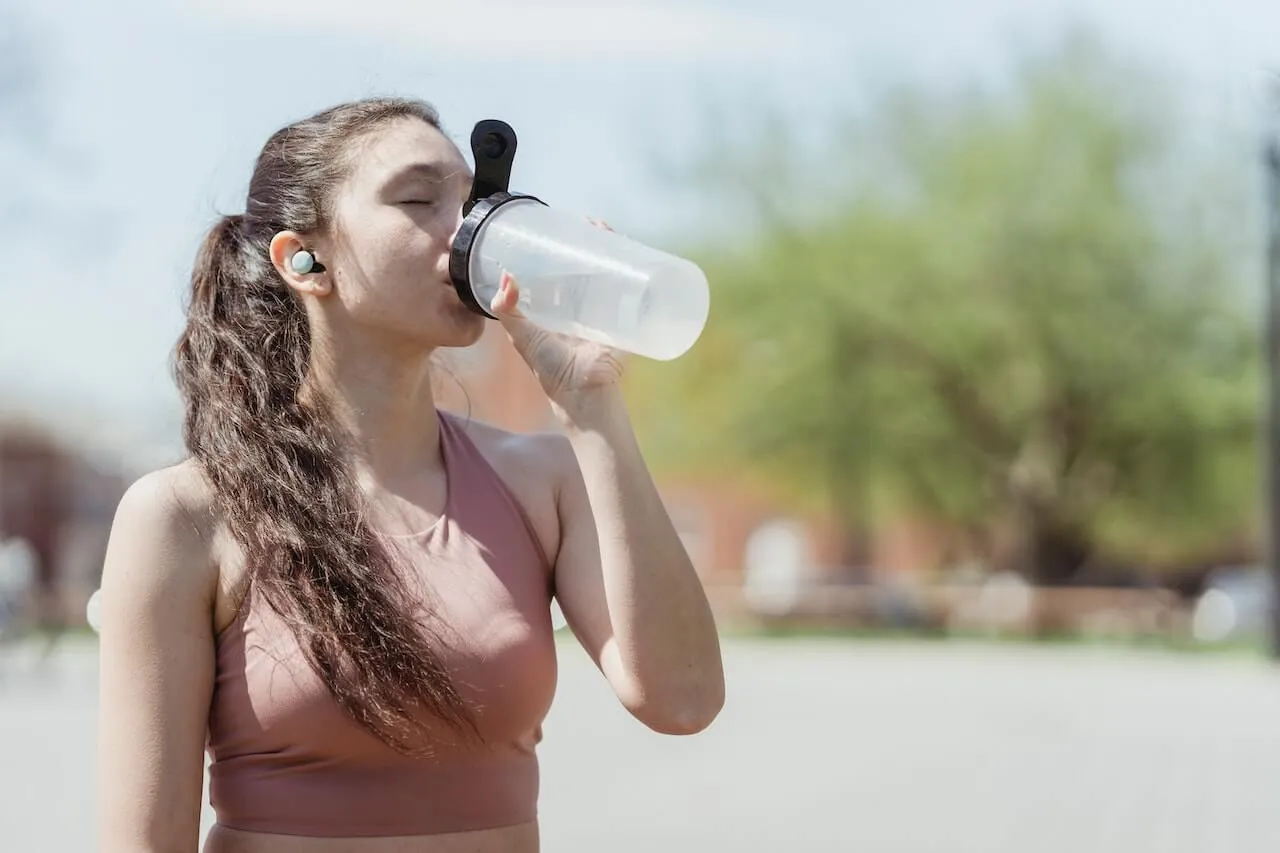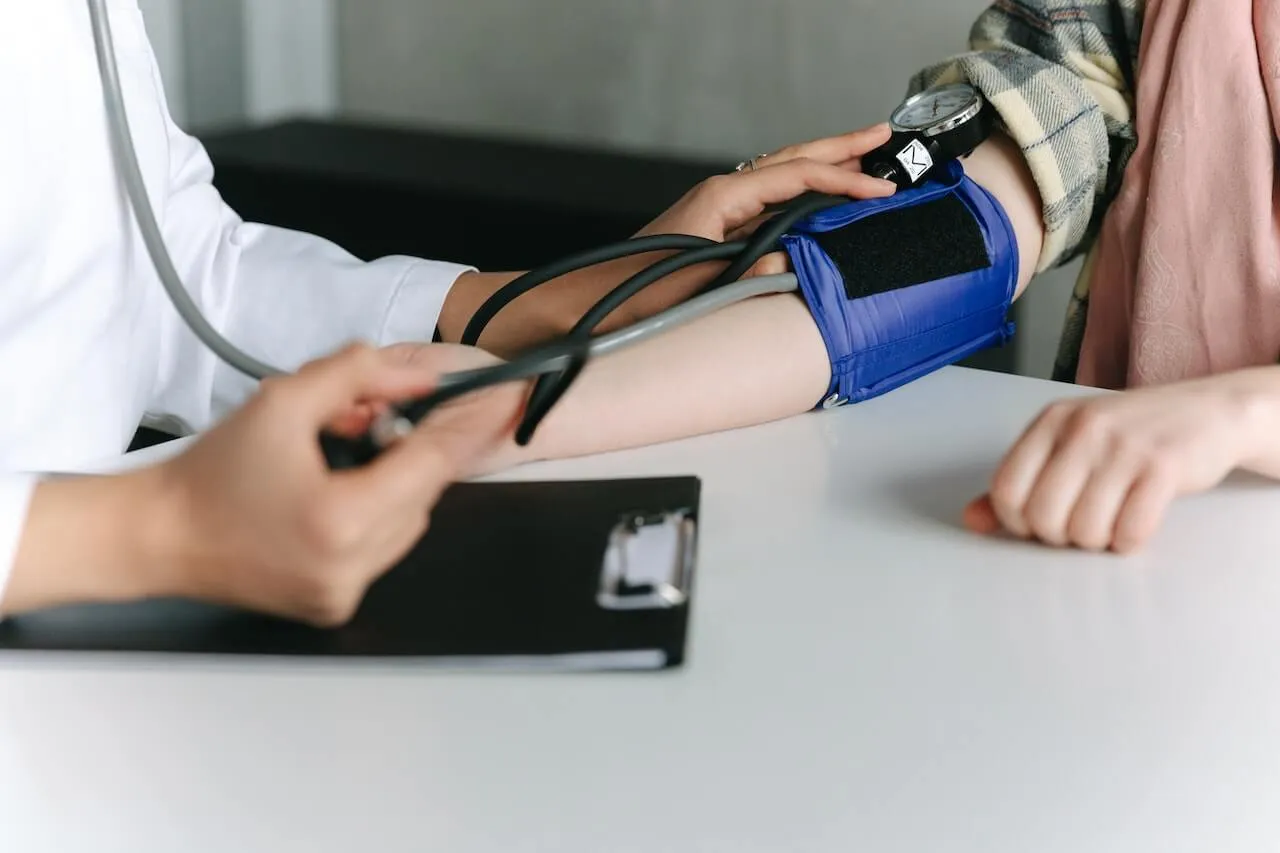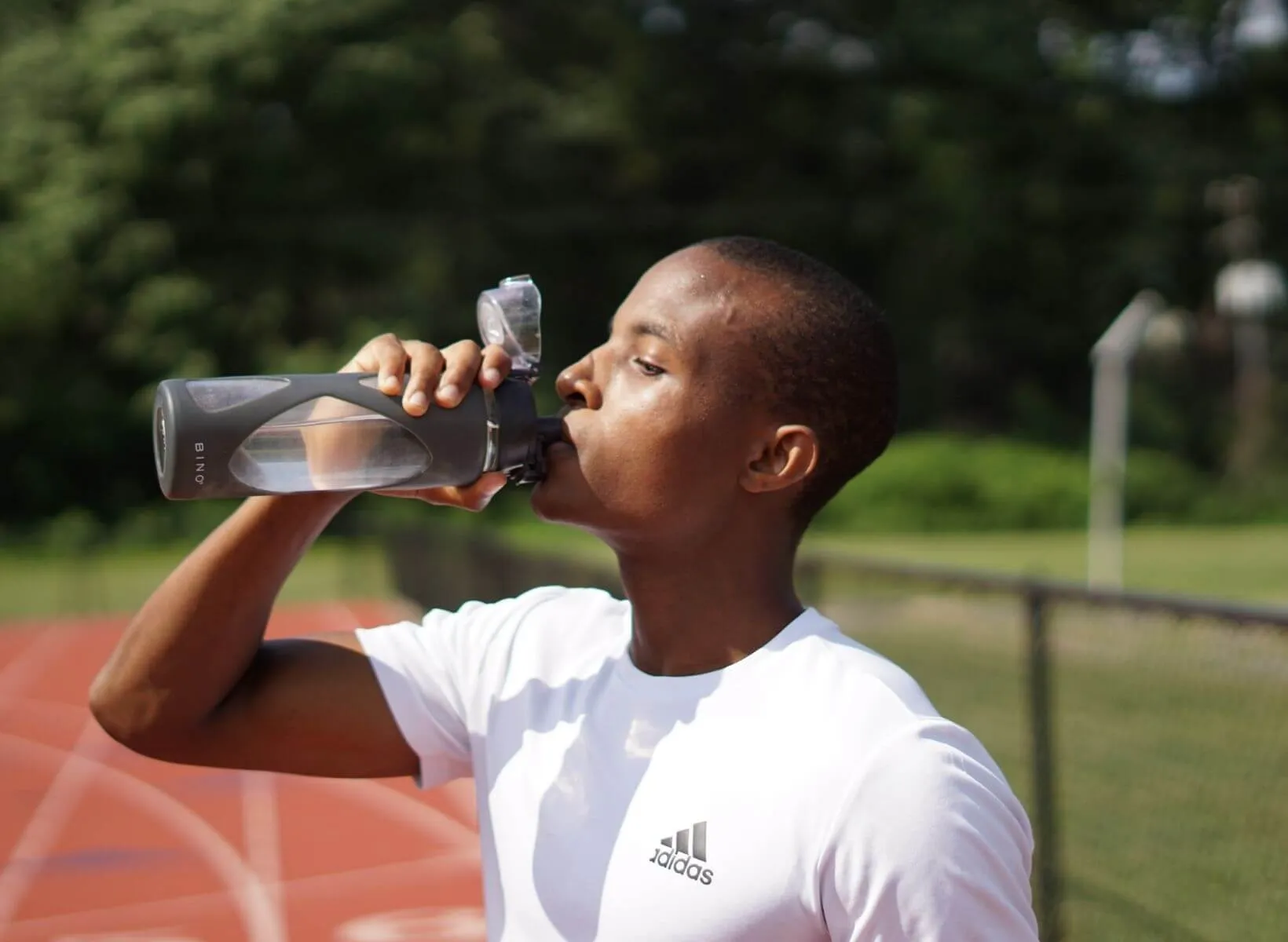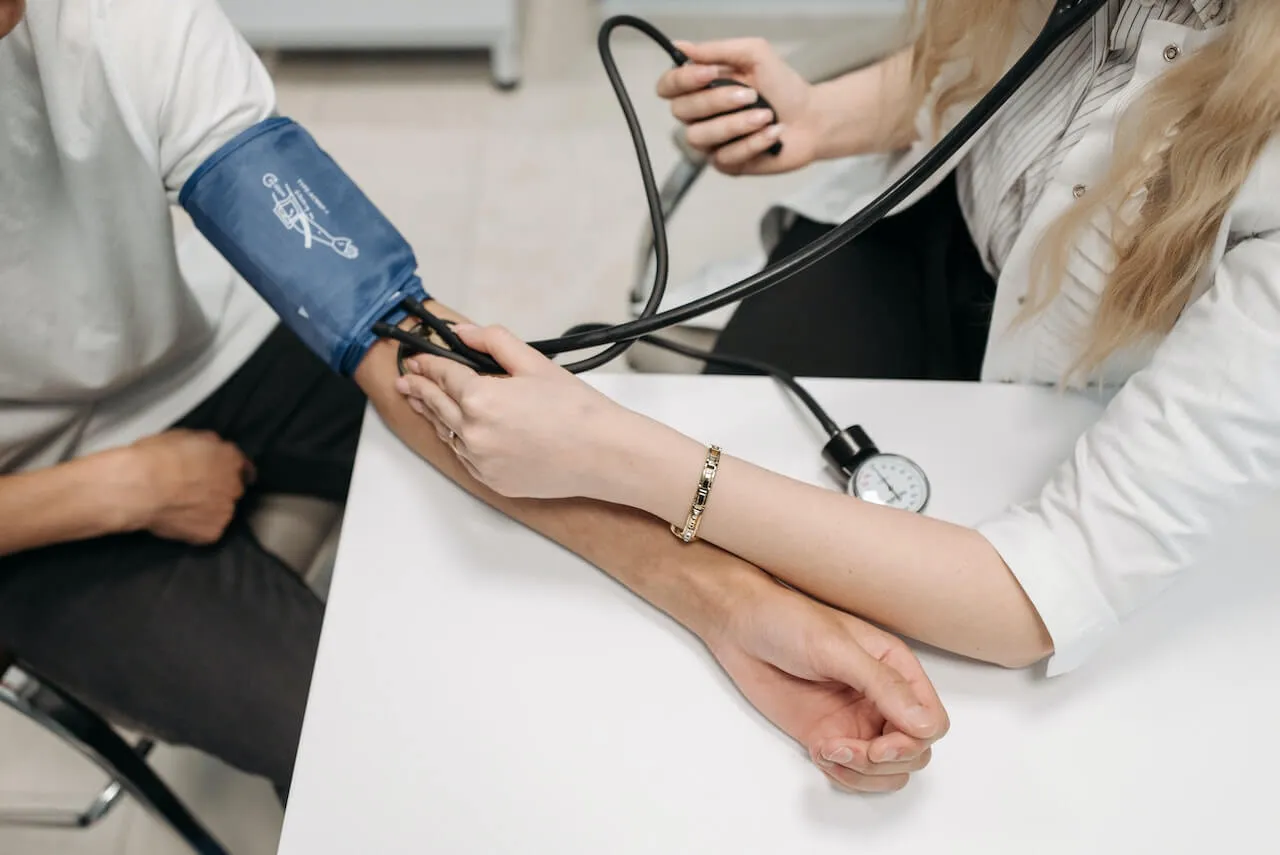There’s nothing like a refreshing glass of water on a hot day. However, the human body needs water much more frequently. Hydration is essential for regulating your bodily functions. Read about its influence on blood pressure to understand how to support your health and wellness.
What’s the Link Between Dehydration and Blood Pressure?
When a person doesn’t drink water throughout the day, their body doesn’t have enough fluids to balance the sodium already in their bloodstream. Sodium is a natural binder that assists nerve impulses, muscle contractions, and mineral regulation.1 However, it can become too intense when there isn’t enough water to dilute it.
If your body senses an imbalance between sodium and hydration, it releases vasopressin. This hormone causes cells to retain more water than usual, boosting your hydration to prevent the adverse effects of high sodium levels.2
Vasopressin improves hydration by restricting your blood vessels. The restriction causes your blood pressure to rise, leading to the symptoms outlined below. It also affects your heart by inflaming vascular tissue and disrupting its functionality.3
This process doesn’t harm the body when it’s a short-term reaction to temporary dehydration. However, if you don’t increase your fluid intake, you may experience long-term blood pressure and cardiovascular issues due to the everpresent vasopressin hormone.
<p class="pro-tip"><strong>Learn more: </strong> <a href="/blog/foods-to-lower-blood-pressure"> 18 Foods to Lower Blood Pressure and Improve Metabolic Health</a>.</p>
Can Dehydration Cause Low Blood Pressure?
Hypotension is low blood pressure caused by dehydration. People experience this condition when they have frequent blood pressure readings below the average result. Experts at the National Institutes of Health estimate a standard blood pressure reading for an adult is a systolic pressure below 120 and a diastolic pressure at or below 80.4
Drinking less water means insufficient liquid to regulate your blood volume. A significant loss in blood volume reduces your overall blood pressure because there’s less blood running through your veins.
You may have experienced low blood pressure at one point if you stood up from a chair and felt dizzy. Other symptoms include:
- Lingering exhaustion
- Blurry vision
- Nausea
- Muscle weakness
- Confusion
Drinking mineral water can assist in moments like this. It contains 250 parts per million of minerals found in underground sources. The sodium and extra water will increase your blood pressure by supplying much-needed hydration to lift your blood pressure back to normal levels.
Can Dehydration Cause High Blood Pressure?
High blood pressure is a chronic condition where the force of your blood is higher than normal and pushes against your blood vessel walls. When not treated, high blood pressure can lead to serious health problems, including heart attacks and strokes.
Infrequent dehydration can cause high blood pressure after happening for various reasons. It’s one of the symptoms of aging, along with salivary gland deactivation due to age-related medications and hearing loss.5 The body cannot regulate itself with as much metabolic energy as in previous decades, so it can struggle to retain fluids as effectively.
Long-term dehydration and high blood pressure may result in a hypertension diagnosis. It means your body releases a near-constant supply of vasopressin to restrict blood vessels and boost blood pressure. Although there are medications to manage this condition, hypertension can cause side effects such as6:
- Blood pressure readings over 140/90 millimeters of mercury (mmHg)
- Dizziness or lightheadedness
- Nausea
- Difficulty breathing
- Increased anxiety
You may also talk to your doctor about drinking electrolyte water to regulate or reduce high blood pressure. Low-sodium electrolyte water won’t increase your body’s sodium levels, but it will introduce potassium to your blood system, which lowers blood pressure by easing constricted blood vessels back to normal dilation.7

Common Symptoms of Dehydration
Keep an eye out for these common symptoms of dehydration to better monitor your health. You’ll know exactly when you need to drink more water and if you should call your doctor to ask about your condition.
Thirst
Your hypothalamus monitors many bodily functions, including sodium regulation. When it senses too much sodium in your bloodstream, it triggers your instinct to grab a glass of water to dilute it.8
Fatigue
People feel exhausted when dehydrated because there isn’t enough blood pressure to circulate blood to their brains. As a result, brain functions slow down, and your body signals a need to rest.
Dark-Colored Urine
The body redirects whatever fluid it has to essential functions during periods of dehydration. So your urine will carry the same number of toxins, but the reduced liquid makes the condensed urine darker.
Infrequent Urination
If you’re significantly or severely dehydrated, your body may slow urine production so much that you have infrequent urination. It’s one of the most common symptoms of dehydration because people generally know when they’re using the bathroom less frequently.
Dizziness
Less blood pressure means your brain doesn’t get as much blood with each heartbeat. So, in addition to fatigue, you may feel dizzy.
Confusion
Cognitive impairment that causes confusion occurs when dehydration shrinks brain cells and impairs their functionality.
Muscle Cramps
Muscle tissue can spasm when there isn’t enough blood volume supplying it with oxygen and red blood cells.
Dry Skin and Mouth
Water improves your body’s ability to hydrate every part of your body. Without enough moisture, your skin and mouth won’t be able to make oil or saliva.
Cravings
Dehydration makes bodily functions more challenging for organs. When the liver can’t access stored glycogen, your brain may crave your favorite foods to supply fresh glucose for ongoing energy.9
Headaches and Migraines
As brain cells shrink from lack of hydration, the tissue pulls away from the skull. Both stages can trigger headaches or migraines, especially if you already have underlying medical conditions that cause those symptoms.10
What Are the Most Frequent Causes of Dehydration?
There are numerous reasons why people don’t always drink as much water as their body needs. Consider if these causes of dehydration may affect your daily health as you reduce how often you feel dehydrated.
Not Drinking Enough Water
Water may hit the spot after some time in the sun, but you may prefer skipping it for less hydrating drinks like soda. Next time, consider drinking flavored water. You’ll improve your hydration, boost your cognitive performance, and reduce your daily intake of sugar.
Heavy Sweating
Your body uses excess hydration to release sweat and regulate your body temperature. Nothing replenishes the lost fluids if you don’t drink water during and after intense physical activity.
Vomiting and Having Diarrhea
You lose excess fluids when spoiled food or viruses cause vomiting and diarrhea. Without drinking a steady intake of fluids during your recovery, dehydration is likely.
Fever
When your body’s core temperature rises to fight an illness or infection, the result is excessive sweating, plummeting your hydration levels.
{{mid-cta}}
Frequent Urination
Urinating always release bodily fluids. Peeing more often than you’re drinking water can trigger a hydration imbalance.
Kidney Diseases
Chronic kidney diseases make it harder for your kidneys to filter blood. If they slow down, they also reduce how much water they filter from the blood with each heartbeat.
Diabetes
People living with diabetes may have overworked kidneys. When there’s too much glucose in the blood for your kidneys to filter, the extra glucose remains in your urine. It pulls fluids from your tissues as it passes through the body,11 resulting in dehydration and an intense need to drink more.
Can Drinking Water Lower Blood Pressure? How Much Water Should You Drink A Day
Drinking more water when you have high blood pressure dilutes the sodium in your bloodstream. As the sodium level balances out, your blood pressure will return to an average reading if you don’t have underlying conditions also affecting it. A recent study found men should drink 3.4 liters of water daily and women should drink 2.6 liters daily to achieve optimal hydration levels.12
Talk with your doctor about how much water you should drink each day. Before recommending a target number, they’ll consider factors such as your ongoing health conditions, weight, activity level, and more.
You can also discuss strategies to stay hydrated besides drinking water. People often rely on these other measures in between the occasional glass of ice water:
- Flavored water
- Sparkling water
- Water-based foods like cucumbers
- Broth
- Milk
Are There Other Ways to Lower Blood Pressure?
Try these common ways to lower your blood pressure alongside your doctor’s recommendations. They may be helpful in addition to prescribed measures like dietary changes and prescription blood pressure medications.
Try to Exercise Regularly
Exercise like cardio routines strengthens the heart muscle. When it’s stronger, it pumps blood more efficiently. There’s less chance of high blood pressure because less of it will build up in your vascular system.
Drink Electrolyte Water
Water with extra electrolytes has natural minerals that balance high sodium levels.
Avoid Smoking
Cigarettes and electronic cigarettes increase a smoker’s blood pressure by flooding their bloodstream with nicotine, constricting blood vessels.13
Limit Alcohol and Caffeine Consumption
Alcohol increases your renin levels, a hormone that tightens blood vessels.14 Caffeine also increases your adrenaline.15 Adrenaline raises your blood pressure, as seen in moments like epinephrine injections.16
Reduce Sugar Consumption
Diets high in added and processed sugars increase systolic and diastolic pressure.17 Opting for no-added-sugar labels can reduce this effect.
Work on Your Sleep Hygiene
Sleeping allows your body to regulate and reset its process for the coming day. Without seven to nine hours of sleep each night,18 your hormone production may become imbalanced and increase your blood pressure.

Prioritize Stress Management
Stress triggers a flood of hormones because your body wants to help you survive in fight or flight mode. However, prolonged stress leaves your blood pressure too high.
Seek the Help of a Health Professional
Your doctor can help you find adequate blood pressure and dehydration solutions because they know your health history extensively. They’ll take any guesswork out of managing your wellness, like recommending diuretics to reduce the fluid in your veins.
When You Should Reach Out to a Doctor
You may need immediate medical attention if you experience one or more of the following symptoms. If the symptoms last longer than a few hours, hospitalization may be necessary to prevent further medical complications.
- Blood pressure higher than 180/110 mmHg
- Blood pressure higher than 140/90 on more than two occasions
- Blurry vision
- Severe headaches or migraines
- Any symptoms that disrupt your routine or quality of life
Using a CGM with Signos: Real-Time Data, Backed by AI
Signos pairs a real-time glucose biosensor with AI trained on tens of millions of data points to deliver personalized, science-backed guidance for weight management and health. See exactly how your body responds, and take action.
Learn how it works. Ready to get started? Join now.
Topics discussed in this article:
References
- Salt and Sodium. The Nutrition Source. (2023, March 7). Retrieved April 3, 2023, from https://www.hsph.harvard.edu/nutritionsource/salt-and-sodium/
- Henry, B. M. (2019, January 21). Vasopressin receptors in islets enhance glucose tolerance, pancreatic beta-cell secretory function, proliferation and survival. Biochimie. Retrieved April 3, 2023, from https://www.sciencedirect.com/science/article/abs/pii/S0300908419300161
- Watso, J. C., & Farquhar, W. B. (2019, August 11). Hydration Status and Cardiovascular Function. Nutrients. Retrieved April 3, 2023, from https://www.ncbi.nlm.nih.gov/pmc/articles/PMC6723555/
- U.S. Department of Health and Human Services. (2022, October 1). High Blood Pressure and Older Adults. National Institute on Aging. Retrieved April 3, 2023, from https://www.nia.nih.gov/health/high-blood-pressure-and-older-adults
- How to Treat Dry Mouth. AZ Family Dental. (29 June 2020). Retrieved April 3, 2022, from https://www.azfd.com/blog/dry-mouth-treatment-guide/
- Oliveros, E. (2019, December 11). Hypertension In Older Adults: Assessment, Management, and Challenges ... Wiley Online Library. Retrieved April 3, 2023, from https://onlinelibrary.wiley.com/doi/full/10.1002/clc.23303?af=R
- Iqbal, S., Klammer, N., & Ekmekcioglu, C. (2019, June 17). The Effect of Electrolytes on Blood Pressure: A Brief Summary of Meta-Analyses. MDPI. Retrieved April 3, 2023, from https://www.mdpi.com/2072-6643/11/6/1362/htm
- Costello, H. M. (2022, November 11). High salt intake activates the hypothalamic–pituitary–adrenal axis, amplifies the stress response, and alters tissue glucocorticoid exposure in mice. OUP Academic. Retrieved April 3, 2023, from https://academic.oup.com/cardiovascres/advance-article/doi/10.1093/cvr/cvac160/6806206
- Shiose, K., Takahashi, H., & Yamada, Y. (2022, December 29). Muscle Glycogen Assessment and relationship with Body hydration status: A narrative review. MDPI. Retrieved April 3, 2023, from https://www.mdpi.com/2072-6643/15/1/155
- Arca, K. N., & Halker Singh, R. B. (2021, July 15). Dehydration and Headache. SpringerLink. Retrieved April 3, 2023, from https://link.springer.com/article/10.1007/s11916-021-00966-z
- Musso, G., Saba, F., Cassader, M., & Gambino, R. (2020, November 12). Diabetic Ketoacidosis With SGLT2 Inhibitors. The BMJ. Retrieved April 3, 2023, from https://www.bmj.com/content/371/bmj.m4147.short
- Seal, A. D. (2022, August 9). Total Water Intake Guidelines Are Sufficient for Optimal Hydration in United States Adults. European Journal of Nutrition. Retrieved April 3, 2023, from https://pubmed.ncbi.nlm.nih.gov/35943601/
- Dimitriadis, K. (2022, March 9). Acute Effects of Electronic and Tobacco Cigarette Smoking on Sympathetic Nerve Activity and Blood Pressure in Humans. Multidisciplinary Digital Publishing Institute. Retrieved April 3, 2023, from https://www.mdpi.com/1660-4601/19/6/3237
- Angiology Journal. (2019). Possible Effect of Alcohol Consumption on Aortic Dilatation by Inducing Renin– Angiotensin–Aldosterone System. SagePub. Retrieved April 3, 2023, from https://journals.sagepub.com/doi/10.1177/0003319719857381
- BUZDAĞLI, Y. (2021, May 15). Effect of caffeine on exercise performance: Current review. Turkish Journal of Sport and Exercise. Retrieved April 3, 2023, from https://dergipark.org.tr/en/pub/tsed/issue/62305/895754
- Dreborg, S., & Kim, H. (2021, March 8). The Pharmacokinetics of Epinephrine/Adrenaline Autoinjectors. BioMed Central. Retrieved April 3, 2023, from https://aacijournal.biomedcentral.com/articles/10.1186/s13223-021-00511-y
- Mansoori, S. (2019, September 3). Added sugar intake is associated with blood pressure in older females. Nutrients. Retrieved April 3, 2023, from https://www.ncbi.nlm.nih.gov/pmc/articles/PMC6770020/
- Patel, A. (2022, September 7). Physiology, sleep stages - statpearls - NCBI bookshelf. National Library of Medicine. Retrieved April 3, 2023, from https://www.ncbi.nlm.nih.gov/books/NBK526132/




.svg)










.svg)
.svg)
.svg)
.svg)
.svg)
.svg)
.svg)
